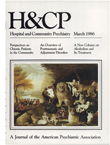Treatment, Care, and Rehabilitation of the Chronic Mentally Ill in the U.S.S.R
Abstract
The U.S.S.R. has established a graduated, differentiated system of psychiatric care based on psychoneurological dispensaries—a type of outpatient clinic—that are linked to mental hospitals or regular district (general) hospitals. Treatment is based on a system of active, ongoing study and follow-up care that permits timely intervention when the patient's condition or circumstances warrant it. Under the dispensary system no more than 8 percent of patients receiving psychiatric care are hospitalized at any one time. Programs of partial hospitalization, including sheltered workshops, day hospitals, and night hospitals, also are heavilyused. Significant numbers of schizophrenic and other psychotic patients are being effectively treated in the day hospitals.
Access content
To read the fulltext, please use one of the options below to sign in or purchase access.- Personal login
- Institutional Login
- Sign in via OpenAthens
- Register for access
-
Please login/register if you wish to pair your device and check access availability.
Not a subscriber?
PsychiatryOnline subscription options offer access to the DSM-5 library, books, journals, CME, and patient resources. This all-in-one virtual library provides psychiatrists and mental health professionals with key resources for diagnosis, treatment, research, and professional development.
Need more help? PsychiatryOnline Customer Service may be reached by emailing [email protected] or by calling 800-368-5777 (in the U.S.) or 703-907-7322 (outside the U.S.).



